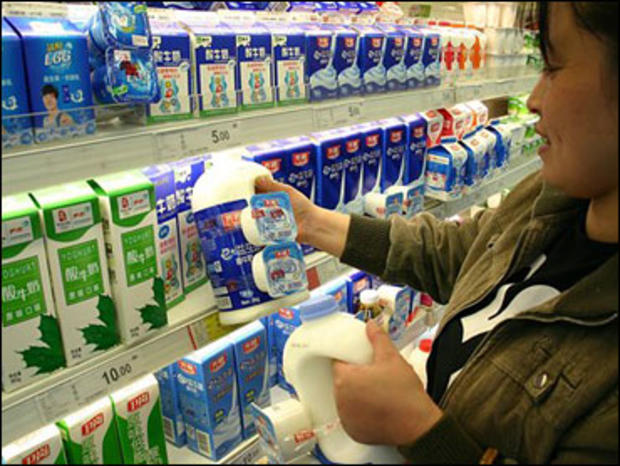U.N. panel sets limits for chemical melamine in infant milk following 2008 China scandal
(CBS/AP) A U.N. panel has set a recommended limit on the amount of melamine allowed in liquid infant formula as a result of the 2008 China scandal in which six babies died from drinking formula and milk products containing the toxic industrial chemical.
Two years ago, the U.N. food security body known as the Codex Alimentarius Commission set the maximum limit of melamine in powdered infant formula at 1 milligram per kilogram of formula. On Wednesday, the commission said it had adopted a limit for liquid formula at 0.15 milligrams/kilogram.
The recommendations are not binding. The commission, which is jointly run by the U.N. Food and Agriculture Organization and the World Health Organization, is made up of 184 government representatives plus the European Commission.
Melamine is used to make dishes and kitchenware, and trace amounts can sometimes get into food from packaging. In China, melamine was being added to watered-down milk it appear as though it was rich in protein during quality tests. Some 300,000 babies became sick after consuming the tainted formula and milk, in addition to the six deaths.
In 2007, melamine was found in wheat gluten and rice protein exported from China that was used in pet food in the U.S., causing a large number of cats and dogs to die from kidney failure, the World Health Organization said.
Consuming melamine may also give a person kidney stones and other kidney damage, HealthPoppreviously reported.
The U.N. commission also made recommendations to limit the spread of salmonella and listeria in pre-packaged melon slices. Codex said the exposed pulp from the fruit can become a breeding ground for bacteria and that the risk was increasing since melon is increasingly being sold in easy-to-eat slices. It recommended that melon be wrapped quickly and refrigerated at 4 degrees Centigrade (39.2 Fahrenheit) or less.
And Codex issued a warning about dried figs: the fruit can host carcinogenic aflaxotoxins, which are produced by mold, if not stored properly. The commission agreed to limit the amount of aflaxotoxins in dried figs at 10 micrograms/kilogram.
The commission, which wraps up its meeting Saturday, is expected to make recommendations on a big issue in livestock circles: the use of growth-promoting veterinary drugs. The commission plans to set maximum residue limits for these drugs, though its members are deeply divided on the issue.
